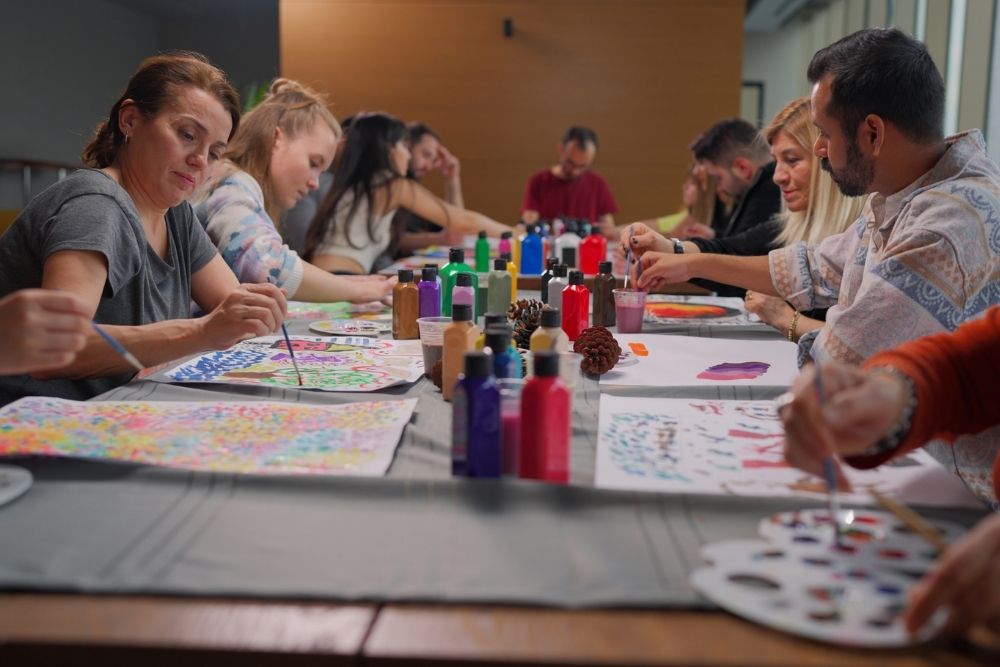Sometimes, we experience something really difficult, but we cannot find the words to talk about what happened or how it makes us feel. Art can be a powerful tool for expressing feelings when words are too difficult. At Carolina Dunes Behavioral Health in Leland, North Carolina, we offer art therapy as part of a full continuum of mental health care. It’s one of many ways we support our patients in recovering from severe psychiatric symptoms or mental health crises. Our structured, short-term hospitalization programs help adolescents, adults, and older adults recover and return to their homes, families, and communities.
A Worldwide Mental Health Epidemic
Around one in four adults will experience a mental health disorder during their lifetime. These often emerge during adolescence. Often, people with behavioral health conditions struggle to find the words to talk about what they are facing. This is partially due to the fact that the part of the brain that handles speech is often altered by trauma. The same isn’t true for the parts of the brain that are used in painting, drawing, or dramatically depicting their experiences and feelings.
What Art Does for Well-Being
Art is a great way to cope with mental health struggles, trauma, and other difficult life experiences. Vincent Van Gogh, Pablo Picasso, Jackson Pollock, and Georgia O’Keeffe are just a few examples of well-known, beloved artists who experienced behavioral health disorders and trauma.
The arts are an alternate form of expression and
- Are a way to temporarily escape or manage painful feelings without having to directly talk about the events that caused them.
- Can be the beginning of a conversation that can help a person to find the words they are lacking.
- Can be a means of developing helpful coping skills
- Reduce the likelihood of a person engaging in maladaptive strategies, such as misusing substances, engaging in self-harm, or lashing out emotionally.
- Activate reward pathways in the brain, improving how the person feels.
- Decrease stress levels
- Decrease symptoms of depression, anxiety, post-traumatic stress disorder (PTSD), and dementia
- Improve pain management
- Enhance a person’s sense of control over their own life
What Is Art Therapy?
Art therapy is a therapeutic intervention that involves a therapist and one or more patients using art to achieve positive mental health outcomes. It’s not about what is created, so much as it is about the process of creation. Often, the art therapist is very quiet for the early part of the session, allowing the patient to create and then discussing their process after the patient is done creating the art.
Art therapy can include:
- Drawing
- Painting
- Acting
- Visual journaling
- Sculpting
- Music
- Creating a collage
Benefits of Art Therapy
Art therapy is a great alternative or supplement to traditional talk therapies because it:
- Carries less stigma: Even people who aren’t comfortable with talk therapy or who don’t accept their mental health diagnosis can connect with their feelings through art.
- Bypasses language: Trauma that happened before a person could speak fluently, or which is too horrific to discuss, can be expressed through art.
- Can build a sense of community: Two people who have never met, don’t speak a common language, and are from very different walks of life can still connect through art.
- Doesn’t require a large financial investment: The basic tools of art therapy do not cost much. Some supplies may even be found in nature or upcycled from garbage.
- Is portable: Art therapists can travel to patients or vice versa, and the media and skills can also be used wherever desired. Patients can also apply the skills they develop in art therapy outside of sessions.
- Can be used with all demographics: Any age, gender, or skill level is suitable for art therapy.
Growth of Art Therapy
As art therapy becomes more widely accepted, there are more and more places that offer this mental and physical health intervention. Nursing homes, hospitals, schools, and groups for service members and Veterans are some places where art therapy is gaining traction.
At Carolina Dunes Behavioral Health, we offer acute psychiatric care for patients aged 12 and over. Our team utilized evidence-based, trauma-informed care to provide services that meet the individual needs of each person and family we serve.





